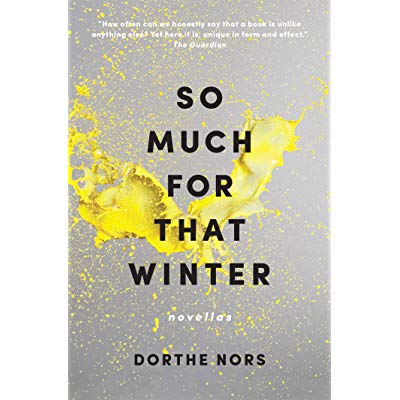
What are your favorite works in translation? That's the question that launches this summer's NBCC Reads series, which draws upon the bookish passions of NBCC members and honorees. (Previous NBCC Reads series dating back to 2007 here.) Tell us why you love the book (in 500 words or less) be it a new one, like Sayaka Murata’s quirky little novel, Convenience Store Woman, or something a bit older, such as Stefan Zweig’s evocative memoir, The World of Yesterday. The deadline is August 3, 2018. Please email your submission to NBCC Board member Lori Feathers: lori@interabangbooks.com
Fortunately for readers of English, the delicacy and elegance of Misha Hoekstra’s translation of Dorthe Nors’ book of novellas, So Much for That Winter (Graywolf Press, 2016) obviates all gaps among languages by staying true to Nors’ rendering of discourse into ideogram, the smallest words made at once more and less important than they appear on their surface. Think of sounds in Sound Poetry, the shared lines, the intersecting spaces, they occupy. Nors relies on the non-semantic effects of words and sentences as much as on their lucid definitions, and her characters' emotive, poignant utterances, spoken and otherwise, depend on that. Without indulging a concrete, visual description of their world, Nors composes, in list form, a typography of observations and remarks along which readers of her novella might follow its heroine, Minna, as if by tracks on snow, syllable by syllable along a discretely embroidered narrative. Typography ideally acts as a transparency by which the world of a story might be entered and engaged, and Hoekstra’s translation, by avoiding embellishment, interpretation, explanation, and deduction, honors Nors’ celebration of this rule. It doesn’t feel like a rule at all, that is, it feels like style, and the result is a charming almost-love story and a deceptively simple portrait of the ever-resourceful Minna, whose perturbations on, say, gender –
Women are tough to swallow.
Minna doesn’t understand why men like women.
Women want to cross the finish line first.
Women want to look good on the podium.
Women are in the running, but
Minna’s from another world.
Minna’s a composer.
Minna’s not a mother. ….
Minna once won a prize for some chamber music.
Minna would rather have gotten a licence to live –
vex, enlighten, move and entertain us.

